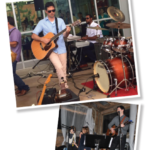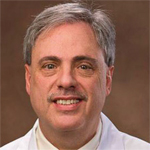
Dr. Schenk
It’s not uncommon for a new patient to arrive at the medical offices of Alan Schenk, MD, in Laguna Woods, Calif., and immediately ask him about his musical career. In addition to being a board-certified rheumatologist for the past 32 years, Dr. Schenk is also an accomplished acoustic jazz guitarist and mandolin player.
Music First
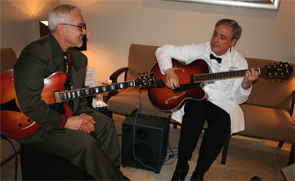
Dr. Schenk with jazz guitarist Sid Jacobs at his office open house in 2010.
“I first took up guitar at the age of 8 on a whim, not to be outdone by a friend,” Dr. Schenk says. “My dad had an old, beat-up Harmony guitar, which was several inches wider than my arm span at the time, and a nightmare to play. Fortunately, I had a wonderful teacher—and a mother who enforced a practice schedule that made me a musician for life.”
While attending medical school at SUNY/Buffalo, Dr. Schenk found a way to pursue both his career and his love of music. He performed at the 1977 Buffalo Folk Festival, sharing the bill with folk singer Tom Paxton, and other noted musicians. Along the way he met other doctors and healthcare professionals who were simultaneously juggling musical careers with medical school.
Specialty Choice
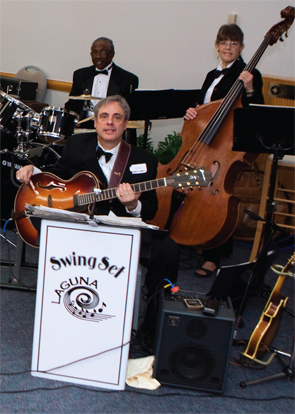
Dr. Schenk (with guitar) and the SwingSet Ensemble at the Saddleback Memorial Medical Center.
“I had a mentor in medical school who was a rheumatologist, and I found the field to be so rewarding,” Dr. Schenk says. “After seeing how I could help someone with arthritis or gout manage their pain and in turn, reclaim their lives, I decided on rheumatology as a specialty field.”
After receiving his Doctor of Medicine from the State University of New York at Buffalo School of Medicine, and completing his internal medicine residency in Miami, Dr. Schenk relocated to Southern California to complete a rheumatology fellowship at the University of Irvine.
Music a Constant
Despite the changes that came with moving across the country, music remained a constant in Dr. Schenk’s life. He settled into private practice in Southern Orange County and quickly learned the area boasted a long list of outdoor music festivals.
“I met a physical therapist, who was also a drummer, when he would periodically drop by our office while on his marketing rounds,” Dr. Schenk says. “One day, he brought with him a fistful of musical charts. Intrigued, I was introduced to the local guitarist/architect who wrote them, and we formed a band called TimbreLine.”
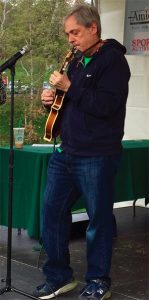
Dr. Schenk at the 2015 Arthritis
Foundation Jingle Bell Run.
By then an accomplished acoustic jazz guitarist, Dr. Schenk was first introduced to the mandolin when he met his wife, Nancy.
“Her sister loaned me her mandolin one night, and I stayed up until 2 a.m., learning to play Yankee Doodle,” he says with a laugh. “I soon discovered the jazz mandolin artistry of David Grisman and began a lifelong love affair with the instrument.”
For 18 years, Dr. Schenk and his bandmates regularly played the Laguna Art Festivals, library concerts, street fairs, the occasional wedding and private parties as an ensemble of up to five pieces, including violin, percussion, mandolin, guitar and acoustic bass.
“Music is a great stress reliever and provides balance in my life,” Dr. Schenk says. “It requires intense focus and creativity, and when I perform, it shuts out all of the demands of the medical world.”
In addition to playing at festivals, Dr. Schenk and his musical group have had an 18-year run at Saddleback Memorial Medical Center’s annual medical staff meetings in Laguna Hills, Calif., where Dr. Schenk served for 18 years as director of the hospital’s Osteoporosis Clinic and for 20 years as director of Continuing Medical Education. He has also performed at hospital events with other ensembles, including a jazz vocal quintet, and an 18-piece jazz orchestra. One of his most recent, and fondest engagements, was a solo performance in suburban Portland, to honor his father’s 91st birthday.
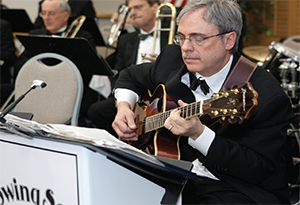
Dr. Schenk (with guitar) and the SwingSet Ensemble at the Saddleback Memorial Medical Center.
“I’ve asked my grown daughter to help me identify some more contemporary music to perform,” Dr. Schenk says with a smile. “To date, my most contemporary tunes are Beatles songs.”
Somewhere down the line, perhaps after his retirement, Schenk also hopes to devote some time to mastering the art of home recording.
“I definitely believe that I have an album in me,” he says. “Yet I never seem to have enough time, even on weekends, to devote to recording my music.”
Music & Medicine
All too familiar with the uplifting effects of music, Dr. Schenk also performs the occasional short concert for his infusion room patients, who are quick to take out their smartphones to snap a picture or record a short video.
“I think when patients see me perform, it decreases the distance between us and they are able to see me as a person beyond the white coat,” Dr. Schenk says. “And I routinely tell patients who skip their medications that improvising is a part of jazz, not medicine!”
Linda Childers is a health writer located in the San Francisco Bay Area.
